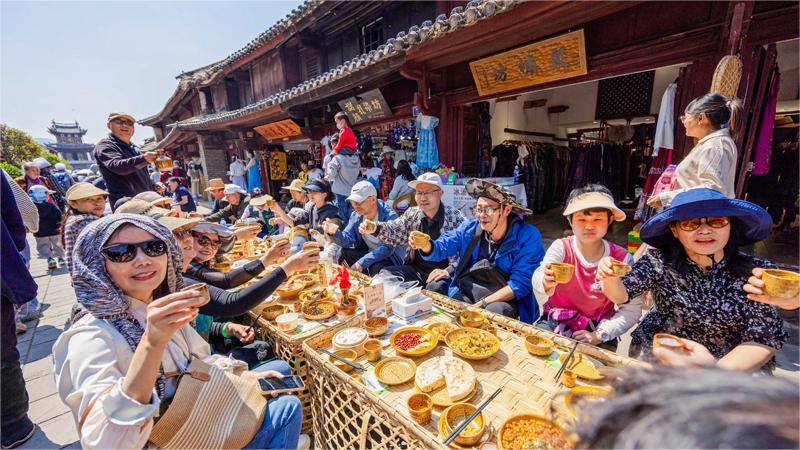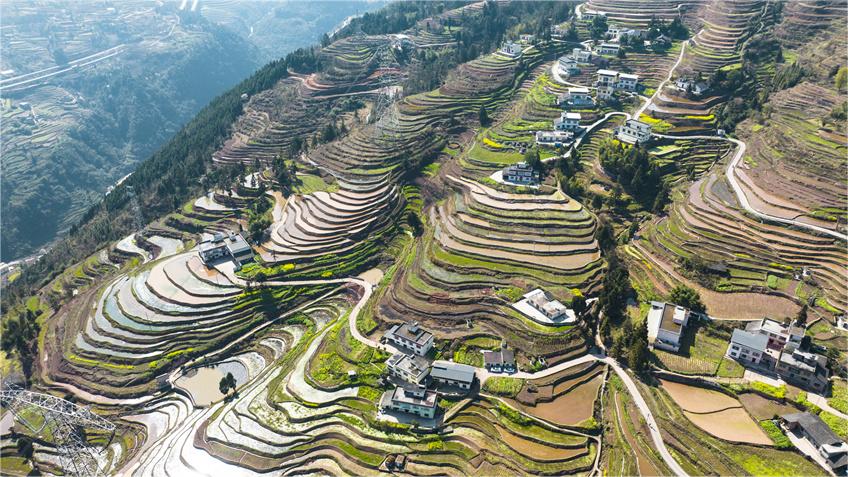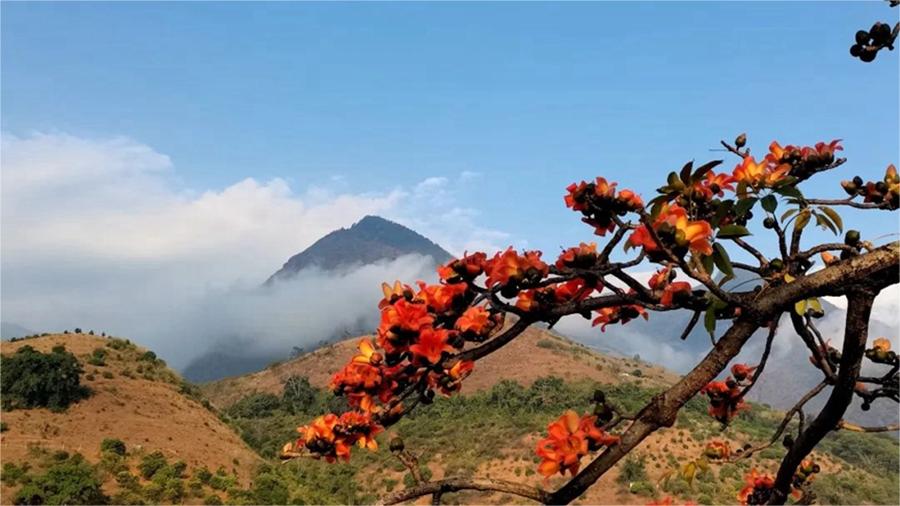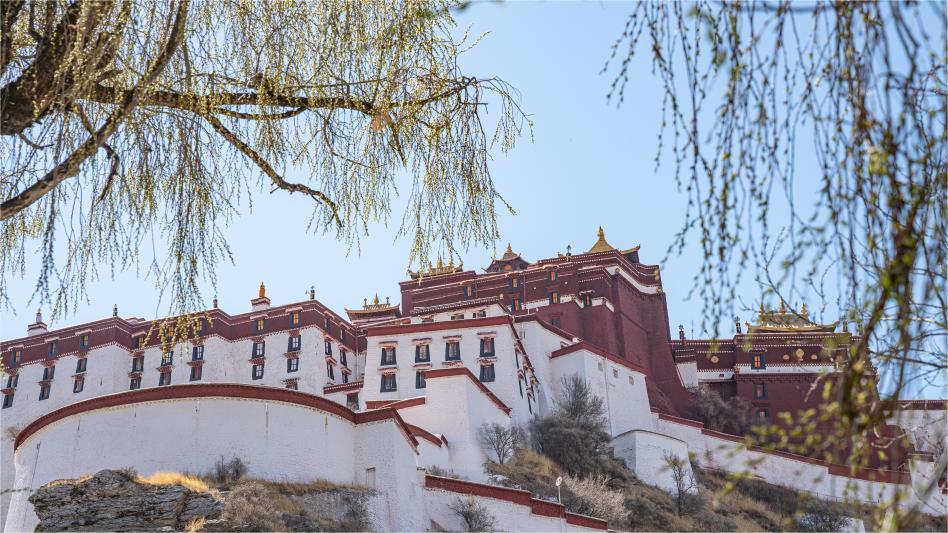From a life of toil to a taste of happiness
LHASA, March 20 (Xinhua) -- The sight of air-dried yak meat, butter tea, and kiwi fruits on tables evokes memories from Drakpa Wangden's childhood and teenage years -- memories dominated by persistent hunger.
"My family consisted of nine people -- my father, mother, six sisters and I," recalled the 80-year-old man. "Each day, our sustenance was a meager bowl of tsampa, a traditional Tibetan staple made from barley flour, no larger than the palm of a child's hand."
Drakpa Wangden's family cultivated four to five mu (from 0.27 to 0.33 hectares) of crop fields, capable of yielding 350 kg of highland barley annually. Despite their toil, they received no compensation.
This hardship stemmed from their status as serfs working on manors affiliated with two monasteries in present-day Lhasa, the capital of southwest China's Xizang Autonomous Region.
Ahead of Serfs' Emancipation Day, which falls on March 28, Drakpa Wangden recounted the transformative journey of his family to Xinhua in his home -- a well-decorated house spanning over 100 square meters.
TASTE OF BITTERNESS
Around the time when he was born, the blight of slavery had largely been eradicated from the face of the Earth, yet Xizang was still firmly in its clutches.
Governmental officials, aristocrats and senior lamas, who represented merely 5 percent of the population, had a monopoly on almost all cultivated land, pastures, mountains, rivers and most livestock. The remaining 95 percent, comprised of serfs and slaves, had neither personal possessions nor personal freedom, let alone human rights.
For Drakpa Wangden's family, each spring meant borrowing land from their masters for planting, only to repay the debts in the harvest season with their entire yield, covering both the rent for the fields and a hut.
The manor where his father worked owned up to 500 mu of land. During the harvest, monks sent by the serf owners ensured the barley was meticulously collected, marked and guarded against "theft" by serfs.
Drakpa Wangden and his companions would also load the bagged barley onto donkeys and transport it to the monasteries and noble households, enduring journeys that could last up to two days, all without any compensation.
"Despite ceaseless toil, we barely sustained ourselves with our efforts, leaving us with scant food and worn-out clothing," said Drakpa Wangden. "Each night, we returned to our rundown hut, bracing ourselves for another day of hardship."
SAVORING HAPPINESS
In March 1959, people in Xizang launched a democratic reform that ended the region's feudal serfdom and freed a million serfs, including Drakpa Wangden's family.
Under the systems of the people's congresses and regional ethnic autonomy that were put in place after the reform, former serfs and slaves were given land, livestock and homes, empowering them as masters of their destinies.
Drakpa Wangden's family received 15 mu of crop fields and farming tools like wooden plows. "I experienced a mixture of emotions -- joy, fear and doubt," he recalled. "I questioned whether all the food truly belonged to our family."
That autumn provided clarity. They harvested 2,000 to 2,500 kg of barley and other crops, all rightfully theirs. Their grain sales that year amounted to 500 yuan (around 70 U.S. dollars).
"It was the first time we tasted the true joy of the harvest," he said. "During the first Tibetan New Year following the democratic reform, our family had the opportunity to taste rice for the very first time."
In the ensuing years, Drakpa Wangden witnessed significant changes in agricultural practices, including the introduction of iron farming tools and fertilizers in the late 1970s, leading to increased yields.
In 1997, he furthered his agricultural knowledge through training and expanded his crop varieties to include wheat and rapeseed.
About 11 years ago, Drakpa Wangden moved to a spacious new house in suburban Lhasa, where he enjoys a comfortable retirement with his three children, a retired public servant, a driver and a housewife. Freed from feudalism, they have benefited from better education and improved living standards.
Though retired from farming, Drakpa Wangden maintains a deep appreciation for the importance of food. Now, he relishes a diverse array of Tibetan and modern foods and beverages, many of which were unimaginable to him in his youth.
His grandson Pasang Tsogyel works in a remote border county in the city of Xigaze, where food production and supply are guaranteed, reflecting the stability and progress in the region's agriculture. Xizang's grain output has remained steady at over 1 million tonnes for nine consecutive years.
In the past, picking highland barley brought back memories of hardship for Drakpa Wangden.
"People in Xizang no longer have to worry about hunger or lack of food," he said. "Now, it's not just grain in my hands, but the taste of happiness itself." Enditem
(Xinhua correspondents Jiang Fan, Purbu Tsering and Wei Guanyu contributed to the story.)
Photos
Related Stories
- Residents in Xizang embrace solar energy for greener, warmer winters
- Black-necked cranes start migration from reservoir in Lhunzhub, Xizang
- Xizang to increase student subsidies
- China's Xizang receives over 3.2 mln tourists in first two months
- China's Xizang receives over 3.2 mln tourists in first two months
Copyright © 2024 People's Daily Online. All Rights Reserved.









